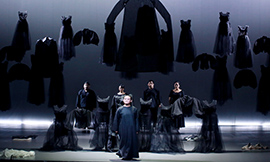
The libretto of this work has been adapted from The Painted Skin, a short story by the Qing Dynasty writer Pu Songling. Its strange plot and strong moral message have made it a classic. Our version seeks to interpret Pus story from a modern perspective, adding new layers by fleshing out the characters inner worlds and exploring the moral message of the story, which raises eternal themes of desire, temptation, sacrifice, and free choice. Both the music and libretto embody Chinese elements, and the stage action integrates physical movement with singing in a profound way. On these two foundations we hope to bring about an innovation in the form of classical Western opera and give this classic tale a new life on stage. Wang ShiruOur main area of research is the integration of elements from physical theatre into opera, providing an impetus for vocal expression and challenging the limitations of rigid singing. The aim is to achieve a more engaging and deep expression on stage through the amalgamation of the body and the voice. Additionally, we seek to introduce elements from Chinese art forms such as traditional Kun opera, striving to help international audiences understand Chinese culture and developing a particularly Chinese style of operatic performance.
Drama
2018